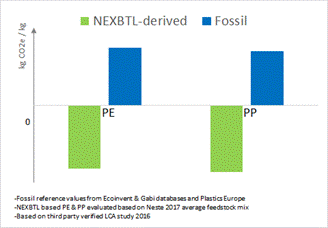(160e) Increasing Sustainability of the Steam Cracking Industry through Drop-in Renewable Feedstock
AIChE Spring Meeting and Global Congress on Process Safety
2020
2020 Virtual Spring Meeting and 16th GCPS
The 32nd Ethylene Producers Conference
Ethylene Plant General Environmental II
Friday, August 21, 2020 - 9:50am to 10:10am
It is a known fact
that the demand for polymers and chemicals is increasing at a high pace, with
studies predicting that demand for polymers will roughly double within the
coming 15 years. In order to meet this demand, several investments in new
capacity for the production of olefins and subsequent products are being made
at a global scale. Consequently, ever-increasing amounts of fossil resources
are being utilized, which puts additional strain on the environment. Steam cracking is
already a mature process, and revolutionary technologies are rather scarce in
the field. In this context, with the aim of improving the environmental
footprint of the process and its products, sustainable feedstock usage is one
of the most straightforward, beneficial and scalable solutions readily
available for cracker operators. In this paper,
technical aspects of Neste’s renewable hydrocarbons
are discussed, focused on their suitability as a drop-in steam cracker
feedstock, as well as their sustainability record and environmental impact,
which is typically evaluated by means of a life-cycle assessment (LCA). It has
been determined that the environmental benefit offered by bio-based
Polypropylene (PP), produced using steam-cracker-based propylene is substantial
[1]. Calculations indicate up to 80% lower CO2 eq. compared to
conventional fossil PP [2].
that the demand for polymers and chemicals is increasing at a high pace, with
studies predicting that demand for polymers will roughly double within the
coming 15 years. In order to meet this demand, several investments in new
capacity for the production of olefins and subsequent products are being made
at a global scale. Consequently, ever-increasing amounts of fossil resources
are being utilized, which puts additional strain on the environment. Steam cracking is
already a mature process, and revolutionary technologies are rather scarce in
the field. In this context, with the aim of improving the environmental
footprint of the process and its products, sustainable feedstock usage is one
of the most straightforward, beneficial and scalable solutions readily
available for cracker operators. In this paper,
technical aspects of Neste’s renewable hydrocarbons
are discussed, focused on their suitability as a drop-in steam cracker
feedstock, as well as their sustainability record and environmental impact,
which is typically evaluated by means of a life-cycle assessment (LCA). It has
been determined that the environmental benefit offered by bio-based
Polypropylene (PP), produced using steam-cracker-based propylene is substantial
[1]. Calculations indicate up to 80% lower CO2 eq. compared to
conventional fossil PP [2].

References
[1]
Environmental impact assessments of innovative bio-based products, Task 1 of
“Study on Support to R&I Policy in the Area of Bio-based Products and
Services “, COWI A/S and Utrecht University EN December, 2018
[2] Neste’s internal and 3rd party verified Life Cycle
Assessment, 2016.
